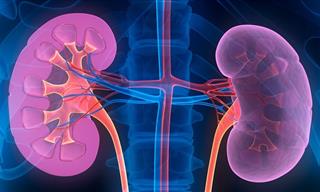1. Oils and fried foods
All cooking oils, be it plant-based oils like olive or avocado oil or animal-derived oils like butter or grease change their chemical composition when exposed to high heat. As you’re frying or roasting foods, the healthy unsaturated fats present in oils turn into trans fats - a type of fatty acid associated with inflammation and heart disease.
Now, different types of oils start this transformation at different temperatures. Oils with a high smoke point like peanut or grapeseed oil are more heat-resistant than those with a low smoke point, like virgin olive oil or pumpkin seed oil. The more you reheat these oils, the greater the percentage of trans fats.
This is why you should avoid reheating fried foods several times, or at all, if possible. For the same reason, it’s important to avoid reusing oil or grease leftover in the pan. Wipe the frying pan clean with a paper towel or wash it before every use.
2. Cooked eggs
One type of food that’s definitely best enjoyed fresh is cooked eggs. Reheating eggs sounds like a weird practice, but you’re actually doing it more often than you think because eggs are the primary ingredient in many foods, such as quiches and casseroles. The nutrients that are affected in the cooking and reheating processes are the antioxidants present in eggs, namely lutein and zeaxanthin. Both of these antioxidants protect the eyes from UV rays, thereby lowering one’s risk of cataracts and macular degeneration.
As a rule of thumb, it’s important to eat cooked eggs as fast as you can. The FDA warns against consuming eggs refrigerated or kept in the kitchen for over 2 hours. This is because eggs are a common source of foodborne illness caused by the Listeria bacterium.
3. Potatoes
Eating a day-old serving of potatoes is no big deal for most people. If you choose to do so, however, you should be aware that you’ll be missing out on some of the important vitamins present in this root vegetable. Studies show that vegetables rich in water-soluble vitamins like Vitamin C, for example, lose a significant amount of these vitamins when cooked or reheated.
Eating a reheated medium potato will provide you with much less than the expected 27 mg of vitamin C, which is about 45% of the recommended daily value of the vitamin.
Like cooked eggs, potatoes can also harbor potentially dangerous microbes, namely Clostridium botulinum, the bacterium that causes the potentially fatal infection called botulism. Avoid eating potatoes that are more than a day old and put freshly-cooked potatoes into the fridge as soon as possible.
4. Vegetables that are rich in nitrates
Examples of vegetables that contain a lot of nitrates are carrots, celery, beets, spinach, and other leafy greens. These chemicals have a bad reputation, but nitrates are actually naturally present in the human body and beneficial to our heart health and physical performance. That being said, exposing nitrate-rich foods to high temperatures turns some of them into compounds called nitrosamines - a known carcinogen.
The European Food Information Council even released a public warning against reheating spinach for this very reason. Ideally, you should eat these veggies raw, but if you must cook them, do so on low to medium heat and resist reheating them.
5. Fish and seafood
Both fish and seafood are best enjoyed fresh, and there are many reasons to abide by that rule. First and foremost, you ought to know that reheated fish is significantly lower in vitamin B6 than freshly cooked fish because this vitamin is among the most heat-sensitive nutrients out there. Many people choose to eat fish to get more B vitamins. If that is you, resist reheating it.
In addition, the FDA recommends discarding any fish or seafood that was out of the fridge for more than an hour or two due to food poisoning risks. So, the safest bet is to eat fish fresh. And besides, even the most delicate seafood and white fish will taste rubbery and tough after reheating it. So it’s best to just skip out on those seafood leftovers.
6. Mushrooms
The European Food Information Council also advises against reheating mushrooms. Mushrooms are rich in proteins, but these proteins tend to deteriorate very quickly in the cooking or reheating process. Enzymes and bacteria continue destroying these proteins even further if they are kept at room temperature.
Consuming such mushrooms could lead to stomach pain and digestive issues, so don’t keep mushrooms that are older than 1-2 days old and preferably enjoy them cold.
7. Risotto
Reheated risotto is very unpleasant: the stickiness of the rice increases, turning risotto from silky smooth to glue-like. But that’s not the only reason why you shouldn’t keep leftover risotto in the fridge. For one, reheated rice is a common cause of foodborne illness. This is because a significant percentage of uncooked rice contains Bacillus cereus, a pathogen that commonly causes food poisoning.
Apart from that, risotto usually includes other ingredients that spoil very quickly, such as mushrooms and dairy. Therefore, it’s best to toss any leftover risotto straight into the trash.
8. Chicken
When you’re cooking a whole chicken, it’s difficult to eat the entire bird in one sitting. Still, the FDA and health agencies around the world advise against keeping chicken in the fridge for more than 3 days and reheating it multiple times for concerns of digestive upset.
Reheated chicken should reach the temperature of 73°C (165°F) in all of its parts before consumption. Use a food thermometer to measure the temperature in different places after reheating the chicken. To prevent reheating the same bird multiple times, divide the leftover chicken into separate portions right after cooking. This way, you’ll need to reheat each piece only once.
Share this information with those who will find it useful!
 Go to BabaMail
Go to BabaMail


























































